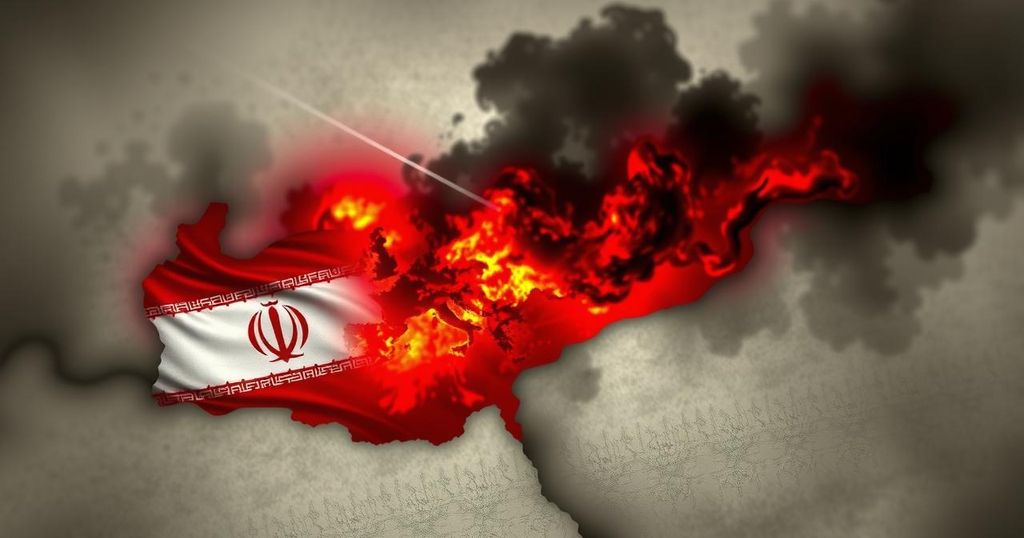Iran maintains its support for President Bashar al-Assad amid opposition offensives, highlighting geopolitical complexities involving Turkiye. While Iran threatens potential troop deployment, significant mobilization has yet to manifest. Ongoing diplomatic discussions suggest a need for collaboration among regional powers to manage the conflict and prevent wider escalation, with concerns about the ramifications of a falling regime in Syria.
The situation in Syria continues to evolve as Iran expresses its steadfast support for President Bashar al-Assad amidst a vigorous military offensive by opposition forces. Recent meetings involving the foreign ministers of Iran, Russia, and Turkiye aimed to cultivate political dialogue in the conflict, emphasizing the need for collaboration to avoid further escalation. Iran’s Foreign Minister, Abbas Araghchi, acknowledged that regional tensions are high, particularly concerning the impacts of the conflict on security across the Middle East.
Iran is wary of the opposition’s gains, launching its offensive from Idlib under the leadership of the Hayat Tahrir al-Sham (HTS) group. The history of HTS, once tied to al-Qaeda, underlines Tehran’s concerns about the nature of the opposition forces. In recent discussions, Iranian officials have refrained from directly criticizing Turkiye despite their differences in supporting opposing factions. Araghchi’s assertion highlights that Iran perceives the rebels as instrumental in a broader American-Zionist conspiracy, thereby framing the conflict as not just an internal civil war.
The Iranian stance towards Turkiye has shifted recently, with Iranian state media now referring to opposition groups merely as “armed groups” rather than terrorists, indicating a strategic recalibration in response to the changing dynamics of Syria’s political landscape. The Iranian leadership remains troubled by Turkiye’s engagement in Syria, which, according to Iranian political analysts, poses risks not only to Syrian sovereignty but also to Iranian interests in the region.
Iran’s potential military involvement presents a precarious dilemma, as Tehran hinted at the possibility of sending troops into Syria. Nevertheless, there has been a conspicuous absence of significant military mobilization thus far. Iranian leaders, including lawmakers, express concern over the dire consequences if al-Assad’s government collapses, suggesting that regional stability hinges on continued Iranian support.
Geopolitical realities dictate that any substantial Iranian military presence in Syria would necessitate significant backing and coordination with allies like Russia. Future developments remain uncertain, especially given the complexities introduced by the ongoing Israeli conflict and the presence of armed groups across Syrian territories. While HTS has sought to project itself as a more moderate force, this remains under scrutiny, given its historical affiliations and ongoing classification as a terrorist organization by international entities.
In summation, Iran’s involvement in Syria’s conflict exemplifies the intricate intertwining of local resistance movements with broader geopolitical strategies, wherein national interests, regional alliances, and global dynamics play vital roles. As armed factions maneuver, Iran’s delicate balancing act between supporting Assad and managing its relationships with regional powers will be crucial for the stability of the Middle East moving forward.
The conflict in Syria, which began in 2011, has witnessed numerous transformations, with various factions vying for power. Iran has been a significant supporter of the Assad regime, providing military assistance and resources to stabilize the government against both domestic rebels and external pressures. Concurrently, the involvement of foreign powers such as Russia and Turkiye complicates the landscape, with each pursuing its geopolitical ambitions. The dynamics are further influenced by the rise and rebranding of groups like HTS, and the ever-changing alliances among nations affected by the conflict.
In conclusion, Iran stands firm in its backing of the Assad regime amid escalating conflicts in Syria. The involvement of regional players like Turkiye complicates matters, prompting Iran to reconsider its strategies and rhetoric. The potential for increased Iranian military presence raises questions about the broader implications for regional stability. Ultimately, the fragile balance of power will depend on the interplay between domestic events and international relations, underscoring the ongoing volatility of the situation in Syria.
Original Source: www.aljazeera.com






